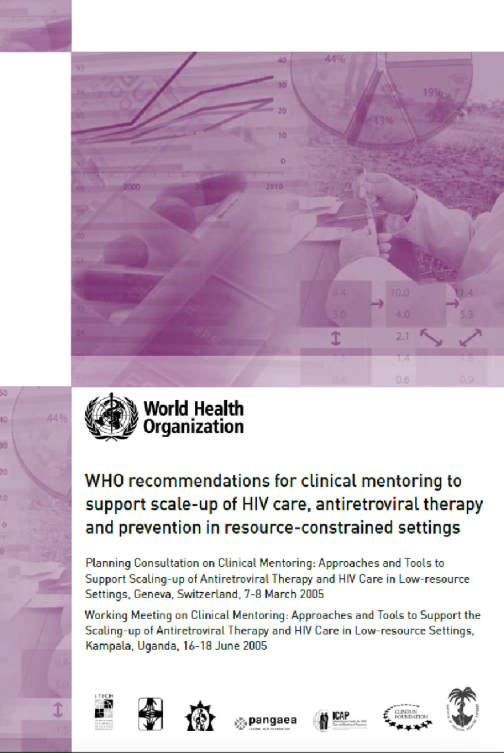District strengthening
The IMAI tools have been designed to address the strengthening of a district network which includes the district hospital, health centers and community-based caregiving, as well as the district management team, which provides administrative services in support of multiple disease control programs and often addresses other sectors in addition to health.
Most IMAI curricula address the whole clinical team and involve the managers/administrators and include tools to support referral and back-referral, mentoring after training, health facility surveys and patient monitoring forms and registers, as well as ongoing quality improvement. IMAI support for decentralization of services expands access to key lifesaving clinical interventions closer to home.
District Strengthening
IMAI tools support several levels of the district network and coordination between levels.
WHO IMAI District Clinician Manual (DCM)- The manual emphasizes developing both skills in emergency care and ongoing management of severely ill patients through clinical reasoning, the development of a differential diagnosis, sending appropriate investigations, treatments and monitoring of patient response, as well as preparing clinicians to implement appropriate infection prevention and control precautions based on the suspected disease(s). The DCM has become a comprehensive tool for the clinical management of most important communicable diseases, developed through the collaboration of WHO departments responsible for neglected tropical diseases, tuberculosis, sexually transmitted infections etc, as well as other common clinical problems of non-pregnant adolescents and adults.
Management training - IMAI tools have been developed to support both managers/senior administrators working at health center and district hospital level, as well as the district health management team.
Mentoring and quality improvement tools - All IMAI training curricula emphasize on-site ongoing learning and quality improvement, supported by clinical mentoring visits. Often trainers based at district or regional hospitals are involved in the clinical team training for first level health facilities then become mentors.
Health facility survey and monitoring tools - Prior to training, health facilities are encouraged to do a baseline assessment of their facilities using these tools. These assessments are discussed during training and used to inform clinical team implementation planning. After training, repeat assessments are recommended in addition to program evaluations for ongoing monitoring.
District hospital (also called general or small hospital) without an ICU
District clinicians (doctors, medical officers, clinical or health officers and senior clinical nurses):
provide consultative back-up
visit clinical teams at the health center to review cases
provide clinical mentoring and on-going monitoring
provide care for referred patients including managing severe or complicated cases
Their work is supported by the District Clinician Manual.
Management training
IMAI tools have been developed to support both managers/senior administrators working at health center and district hospital level, as well as the district health management team. For HIV and NCD care at health center level, a practical operations manual is provided for health centers (link to HIV and NCD operations manual) as well as support for drug supply management (link to NCD drug supply tool). In addition, tools aimed at the district health management team can help them provide important support to the health center in terms of supply, laboratory, hiring health workers, transport, arranging training and mentoring after training, and supportive supervision.
Mentoring and quality improvement after training
All IMAI training curricula emphasize on-site ongoing learning and quality improvement, supported by clinical mentoring visits. Often trainers based at district or regional hospitals are involved in the clinical team training for first level health facilities then become mentors.
Support for adopting quality improvement approaches in the district hospital is a key part of implementation planning by the clinical team at the end of the Quick Check+ training. This is emphasized in the training module for Managers, the most recent being the PMME module in the SEARO SARI tools:
SEARO IMAI Planning, Mentoring, Monitoring and Evaluation module (PMME) (link to SEARO SARI web) This is for use during health facility visits before and after training. It can be used in training hospital managers and administrators, but is also relevant to the hospital clinical team.
Clinical mentoring visits and back-up by phone after HIV care/ART training for case review, problem solving, quality assurance, and continuing education are key to building successful district networks for HIV care. The comprehensive WHO recommendations for clinical mentoring to support scale-up of HIV care, antiretroviral therapy and prevention in resource-constrained settings (2006) are based on broad international consultations held in Uganda in 2005. Among other topics, the guidelines cover the development of national systems of clinical mentoring, the selection and training of mentors and approaches and tools for mentoring. Although developed for HIV/ART mentoring, the principles and approach are relevant for clinical mentoring after training for other programs.


